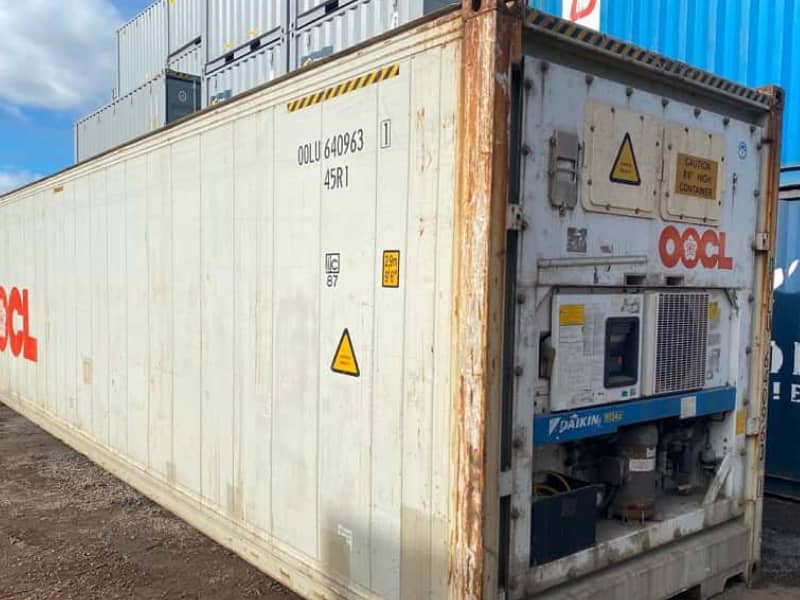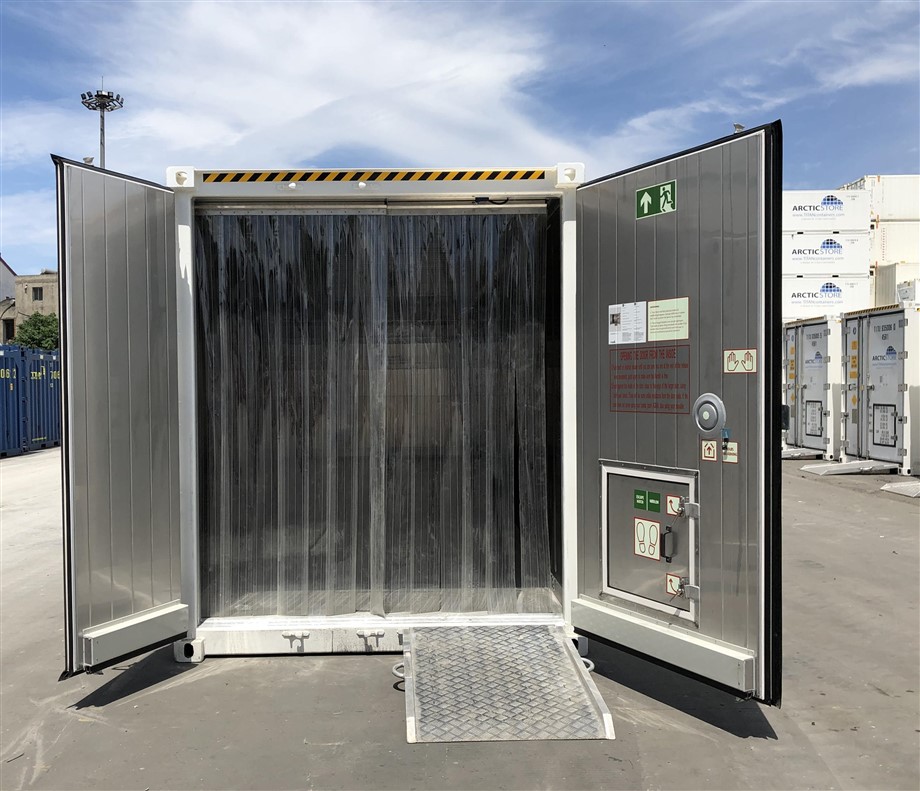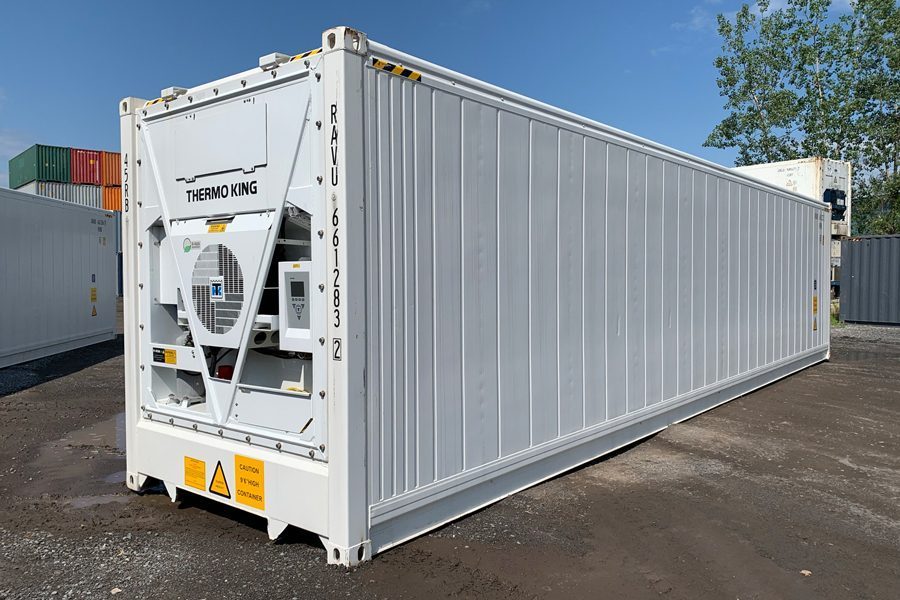All About Cold Store Containers: Important Insights for Your Storage Space Needs
Cold store containers play an important function in the preservation of disposable goods. They can be found in numerous kinds, consisting of chilled and insulated units, each designed for particular storage space requirements. Comprehending the benefits and crucial functions of these containers is necessary for companies aiming to optimize their procedures. As the demand for reliable storage space options grows, exploring the various choices available can lead to informed decisions that impact both success and sustainability. What variables should one consider when choosing the right container?
Kinds Of Cold Store Containers
Freezer containers can be found in different kinds, each designed to fulfill certain temperature level control demands. Among one of the most common kinds are refrigerated containers, which keep temperatures in between 0 ° C to 10 ° C, making them suitable for perishable items like fruits, vegetables, and milk items. One more kind is the deep fridge freezer container, which operates at temperature levels listed below -18 ° C, perfect for lasting storage space of frozen things such as meats and seafood.
Insulated containers offer temperature stability without active air conditioning, making them useful for temporary transport of temperature-sensitive products. Furthermore, there are mobile freezer units, which supply flexibility in locations and are typically utilized in occasions or seasonal procedures. Blast refrigerators swiftly decrease the temperature of warm foods, ensuring safety and security and high quality. Each type serves an one-of-a-kind function in numerous industries, from food service to drugs, emphasizing the importance of choosing the best container for specific storage space demands.

Benefits of Utilizing Freezer Solutions

Cold storage space services expand the shelf life of things, lowering waste and boosting profitability for services. By efficiently managing supply with proper temperature control, business can enhance their supply chains and improve functional effectiveness.
In addition, chilly storage space facilities enable adaptable storage alternatives, accommodating different quantity requirements and seasonal variations in demand (used 40ft refrigerated shipping containers). This adaptability helps businesses respond swiftly to market changes
Using cold storage space solutions can guarantee conformity with wellness and safety and security regulations, safeguarding both services and customers. Overall, the critical use of chilly storage boosts item management while advertising sustainability and economic stability.
Trick Functions to Search For in Cold Store Containers
When picking freezer containers, several vital functions value careful consideration to protect peak efficiency and dependability. Temperature level control capacities are necessary; containers must preserve regular temperatures ideal for particular items. Insulation high quality likewise plays a considerable duty, as exceptional insulation reduces power intake and improves temperature security.
Next off, convenience of access and loading is important; containers must provide easy to use layouts for effective handling and company. Resilience is an additional important aspect; weather-resistant materials assure long life and secure components against ecological factors.
Additionally, wheelchair attributes, such as integrated wheels or lifting points, help with transportation, while personalized layouts enable tailored storage space options.
Keeping an eye on systems, consisting of temperature alarms and remote monitoring, provide real-time updates, making specific that problems continue to be perfect. By focusing on these features, users can choose freezer containers that satisfy their functional needs effectively.
Picking the Right Cold Storage Space Container for Your Demands
Selecting the ideal freezer container needs a thoughtful evaluation of certain needs and functional needs. Factors such as the sort of products being kept, temperature level sensitivity, and quantity should be prioritized. Subject to spoiling food things may require containers with rigorous temperature level controls, while pharmaceuticals may require accurate conditions to maintain efficacy.
Additionally, potential individuals need to think about the container's size and mobility. A bigger unit might be needed for mass storage, while smaller sized, portable options can be perfect for on-site or short-lived needs. Insulation high quality and energy efficiency are also critical, as these will certainly affect functional expenses and temperature stability.
Conformity with sector guidelines and criteria is vital, specifically in sectors like food and health care. By carefully reviewing these elements, customers can select a freezer container that efficiently meets their special requirements and warranties optimum storage problems.
Best Practices for Keeping Cold Store Issues
Preserving perfect cool storage space problems is important for preserving the top quality and safety and security of temperature-sensitive items. Frequently checking temperature and humidity levels is vital; utilizing trusted digital thermometers and hygrometers can supply accurate readings. In addition, correct insulation of freezer containers assists decrease temperature variations and energy loss.
Executing a first-in, first-out (FIFO) system assures that older inventory is utilized prior to more recent supply, minimizing waste (used 40ft refrigerated shipping containers). Additionally, preserving an organized format within the storage room permits far better air flow and decreases the risk of cross-contamination
Routine maintenance checks on devices, such as seals and compressors, are essential to stop breakdowns. Team training on ideal methods for loading and unloading items helps keep temperature level integrity. Finally, keeping doors shut as much as feasible limitations warmth exchange, assuring that the freezer environment remains reliable and secure in maintaining important products.
Cost Factors To Consider for Cold Storage Solutions
When assessing freezer solutions, it is important to think about the first investment prices alongside continuous functional costs. An extensive breakdown of these prices can expose significant long-term financial savings capacity for companies. Understanding these monetary aspects aids stakeholders make informed choices concerning their chilly storage space requirements.

Preliminary Investment Expenses
The financial landscape of cool storage containers provides numerous initial financial investment costs that organizations need to consider. These prices normally include the acquisition or rental price of the containers, which can differ based on kind, insulation, and size quality. In addition, costs connected to retrofitting existing frameworks to suit freezer must be factored in, especially if specialized devices is called for. Installation prices, consisting of electrical job and refrigeration systems, likewise contribute to the overall first financial investment. Companies ought to not forget transportation expenses for delivering containers to their preferred place. Ultimately, prospective modification options, such as shelving or temperature monitoring systems, can better influence the preliminary financial investment. Mindful budgeting for these elements is important for effective cold storage space execution.
Functional Expenses Malfunction
Functional expenses for cold store services include a number of vital cost considerations that organizations need to browse. Secret elements consist of power costs, which can be significant because of the demand to maintain low temperatures. Upkeep costs are likewise considerable, as regular maintenance is important to ensure devices operates effectively and continues to be certified with health and safety requirements. In addition, labor expenses might develop from the requirement for specialized personnel to check the storage and take care of atmosphere. Insurance coverage expenses are one more factor to consider, as companies must safeguard their investments versus potential losses. Finally, any kind of potential governing conformity prices must be factored in, as companies might need to invest in systems that abide by food safety and security and environmental guidelines. Recognizing these expenditures is critical for reliable budgeting.
Long-Term Cost Savings Potential
Purchasing cold store solutions supplies considerable long-lasting savings possibility, transforming initial expenses right into economic efficiency in time. By decreasing spoilage and waste, companies can improve their earnings margins substantially. Advanced insulation and energy-efficient systems reduce energy costs, which build up over the life expectancy of the devices. Cool storage space containers usually require much less constant upkeep compared to conventional refrigeration techniques, leading to lower repair service costs. The ability to store products for prolonged periods without jeopardizing top quality enables organizations to maximize market variations, enhancing earnings. Furthermore, the scalability of freezer options allows firms to adjust to transforming needs without sustaining extreme costs. On the whole, these variables add to a compelling situation for cool storage space as a cost-efficient financial investment strategy.
Often Asked Concerns
Just How Lengthy Can Food Be Stored in Cold Store Containers?
The duration food can be stored in freezer containers varies by type. Generally, perishable products last from days to weeks, while frozen foods can stay secure for months, relying on correct temperature level and storage space problems.
Are Cold Storage Space Containers Energy-Efficient?
The energy effectiveness of freezer containers varies based upon layout and insulation quality. Modern devices usually utilize innovative innovation to lessen power usage, inevitably adding to minimized operational costs and environmental impact in long-term use.
Can Freezer Containers Be Custom-made for Details Demands?
Freezer containers can undoubtedly be customized to meet particular needs. Alterations might include temperature level controls, dimension changes, and added functions, permitting individuals to tailor remedies successfully for numerous storage space demands and operational preferences.
What Are the Usual Sizes of Cold Store Containers?
Cold storage containers normally come in common sizes such as 10, 20, and 40 feet. These dimensions fit numerous storage requirements, making certain versatility for companies requiring temperature-controlled atmospheres for perishable items or delicate products.
Do Freezer Containers Require Special Licenses for Usage?
Cold store containers frequently call for special authorizations for use, depending upon local guidelines and planned applications. Authorities may mandate licenses to guarantee security criteria, environmental conformity, and correct functional techniques are preserved during their usage.
Cold storage containers come in numerous kinds, each developed to meet specific temperature level control requirements. Furthermore, cold storage space facilities allow for adaptable storage space alternatives, accommodating different quantity needs and seasonal changes in need. Picking the right chilly storage container calls for a thoughtful assessment of particular requirements and functional needs. The economic landscape of chilly storage space containers offers numerous preliminary financial investment expenses that organizations must consider. Cold storage used 40ft refrigerated containers containers can certainly be personalized to satisfy specific demands.